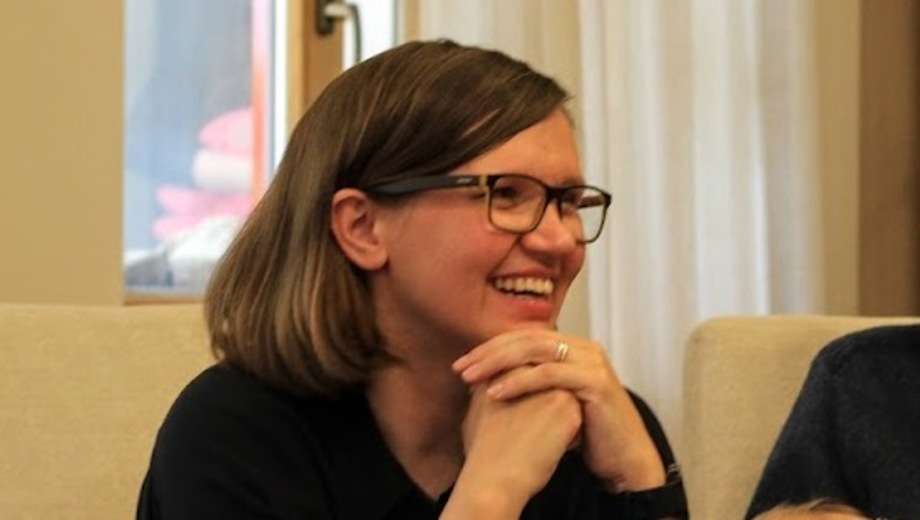Married and mother of 4 children, Judita Velziene is a psychologist and lives in Kaunas, one of the main cities in the country. Lithuania. At present, most of the members of the Opus Dei is made up of supernumeraries like Judita, all over the world.
Judita stresses that "the essence of vocation is identity, not merit". It is not about doing things but about one's personal identity and unique relationship with God. A vocation that she lives in her day to day life in her family and in her professional work as a psychotherapist.
How did you discover your vocation to Opus Dei?
-I had already started a family, had children and was working successfully in a large business corporation when I felt that my faith lacked life. I was living under a lot of pressure, juggling family and work commitments, and my faith lacked any kind of support and nourishment. Then my brother introduced me to a person from the Opus Dei who became a very good friend. Shortly thereafter, she invited me to participate in a retreat course. There, the armor that I had built throughout my life, which should have protected and strengthened me, but instead enclosed and hardened my soul, slowly began to disintegrate. All the spiritual formation of the Opus Dei It reminded me a lot of the teachings I had received from my grandmother and my parents about God and the Church.
I rediscovered how great God's love is and how beautiful and personal his relationship with me is. This helped me to turn my eyes back to my family, avoiding excessive immersion in my professional career, thus restoring balance in my life. When I began to seriously consider whether God was calling me to Opus Dei, I realized that from the beginning I felt at home.
For me it is very important to have a constant relationship with God in my day-to-day life, as he is like an axis around which my family and professional life revolves. I realize very quickly when I stray from that axis and I know where I need to go to get back to where I belong.
What does it mean to have a vocation and not just "do good things"?
-It seems to me that the essence of vocation is identity, not merit. The question is not what you do, but who you are. When you answer that question of who you are, you do good things in a very different way. It becomes your signature and not a tiring duty. Also with limitations, you try to see yourself with God's eyes, with God's mercy and God's patient teaching, to be more in line with your true identity.
How does this vocation influence your work?
-I am a psychotherapist and in my work I deal daily with the psychological difficulties, pain and suffering of people. Once, in a meditation, a priest pointed out that where there is suffering, there is always Christ. This impressed me, and since then, every day at work, I remember that when I am with human suffering, I am very close to Christ, because He is always there. This amazes me and at the same time obliges me to do my work to the best of my ability.
I pray the Rosary on my way to work and always pray a mystery for the clients of the day and their intentions. The Work has helped me a lot to cure me of perfectionism, which was a big obstacle at the beginning of my career.
I often saw things in black and white, became overwhelmed and began to reject work in general. But Opus Dei has taught me, patiently and constantly, to sanctify my work, to try to do it in the best possible way little by little. This helps me a lot.
Today, most of the members of Opus Dei are supernumeraries, but it is still a little known vocation. How do you explain your vocation to your friends?
-I feel that I have been a supernumerary for too short a time to be able to explain my vocation well. But, since I live among the people, every time this question comes up, I can learn to answer it better, and at the same time I rethink my own understanding of it. I usually say that what it is all about is to keep looking for God in your daily life, wherever you are: in the people around you, in the work you do, at home and in your professional life.
Your day-to-day life takes place in your family and in your parish. Do you collaborate in the parish community to which you belong?
-The parish to which my family and I belong is very strong and very much alive. In choosing a location for our home, among other practical things, we were also concerned about having a church nearby. When we moved, we found such a strong community that we never cease to rejoice and thank God for it. When we can, we also try to contribute to the life of the parish by helping engaged couples prepare for the sacrament of marriage.
As a supernumerary, what do you receive from Opus Dei?
-I receive many things: spiritual formation, human formation and friends. But I especially value unity in prayer.
A month ago, one of my sons had an accident and suffered a head injury, which was a shock to our entire family. Despite the stress and difficulties, everyone's prayers kept us hopeful and strong. This is truly a special bond among the faithful of Opus Dei.








